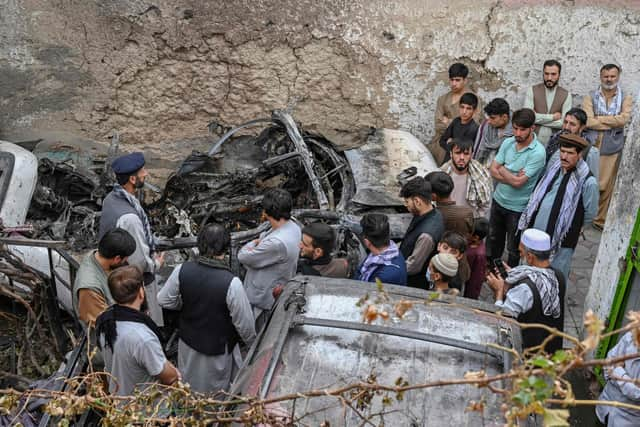UK a 'long way' from giving diplomatic recognition to Taliban in Afghanistan
James Cleverly said the Taliban would be judged on its actions as an intensive round of diplomacy began in Washington and at the United Nations.
The Taliban has been urged to allow safe passage to people seeking to leave Afghanistan as Foreign Office minister Mr Cleverly acknowledged it was impossible to say how many people eligible to come to the UK were still in the country.


Advertisement
Hide AdAdvertisement
Hide AdAround 15,000 people had been evacuated from Afghanistan in a “herculean” effort, Mr Cleverly said, but Labour has claimed around 5,000 may have been left behind and ministers have faced criticism over the UK response.
Mr Cleverly acknowledged some emails about desperate Afghans seeking to leave may not have been read in the Foreign Office as priority in the evacuation effort was given to people who could be processed and reached Kabul airport before the airlift ended.
With the final withdrawal of US forces from Afghanistan due on Tuesday, violence continued in Kabul.
Rocket fire apparently targeting Kabul’s international airport struck a nearby neighbourhood on Monday, but US military C-17 transport planes continued the withdrawal effort as 20 years of Western military presence drew to a close.
The so-called Islamic State group’s offshoot in Afghanistan, IS-K, claimed responsibility, days after it launched a devastating suicide bombing at one of the airport gates that killed at least 169 Afghans, 13 US service members and two Britons along with the child of a British national.
The group claimed it fired at least six rockets at the airport in the Afghan capital. The US military said five rockets targeted the airport on Monday morning, but were intercepted.
On Sunday, a US drone strike blew up a vehicle carrying IS suicide bombers before they could attack the military evacuation at Kabul’s airport, American officials said. Reports suggested at least ten civilians, including children, were among the dead.
US secretary of state Antony Blinken will host a virtual meeting on Monday afternoon with key allies, including foreign secretary Dominic Raab and the other G7 powers, along with Nato, Turkey and Qatar.
Advertisement
Hide AdAdvertisement
Hide AdMeanwhile, the UK’s UN ambassador Dame Barbara Woodward will discuss the situation with her counterparts from the four other permanent member countries of the UN Security Council – China, France, Russia and the US.
The UK hopes the influence Russia and China could have over the new Afghan government could be key to countering terrorism and the trade in narcotics, preventing a refugee crisis and further economic collapse.
Prime Minister Boris Johnson has said that if the Kabul regime wants diplomatic recognition – and the unlocking of frozen assets – it must allow safe passage for people wishing to leave, prevent Afghanistan again becoming a base for international terrorists, and respect the rights of women and girls.
Mr Cleverly told the BBC the Taliban would be judged “on their conduct not their words”, adding the government was “quite sceptical” about the commitments the new Kabul regime had made.
“They have said that they want to be treated like a legitimate government,” he said. “And there’s a long way to go before we might consider that.”
While the international community considers how to treat Afghanistan’s new rulers, people seeking to flee the country to reach the UK must now rely on overland routes after the British airlift concluded.
Mr Cleverly refused to give an estimate of how many people had been left behind, saying it was an “impossible number to put a figure on”.
The “vast, vast bulk” of British nationals had left Afghanistan, he told Sky News, but there were also eligible people under the Afghan Relocations and Assistance Policy (Arap) scheme – for people who helped UK forces – and others who could be under threat from the Taliban.
Advertisement
Hide AdAdvertisement
Hide Ad“We are going to continue working to get people out who fall into those groups – predominantly now, of course, it will be in that third group – people at risk of reprisals, whether they be high-profile individuals, of religious minorities or others who may be under severe risk of reprisals from the Taliban,” he said.
Mr Cleverly acknowledged that emails from Afghans desperate to leave the country may not have been read.
Asked if he had unread emails in his inbox, he told the BBC: “I suspect everybody has.”
More than 15,000 people have been evacuated by the UK since August 14, but hundreds of people who are entitled to come to the country have been left behind.
It is feared up to 1,100 eligible Afghans, including those who worked for the UK Government, and as many as 150 British people were unable to get on evacuation flights.
The government had received a “huge number of emails directly from Afghanistan and from third parties” after announcing it would help Afghans at risk of reprisals from the Taliban.
“We have been and will continue to work through the significant number of emails that we have received to try to get as many other people out of Afghanistan as possible,” he said.
Securing exit routes for people out of Afghanistan will be one of the key topics in the international meetings on Monday.
A statement from the UK and more than 90 other countries and organisations said assurances about safe passage had been received from the Taliban.
Comments
Want to join the conversation? Please or to comment on this article.
